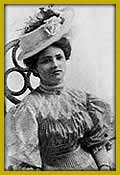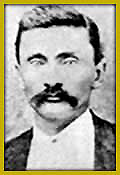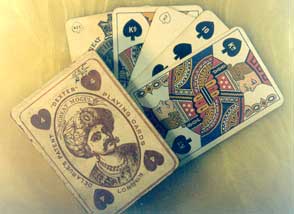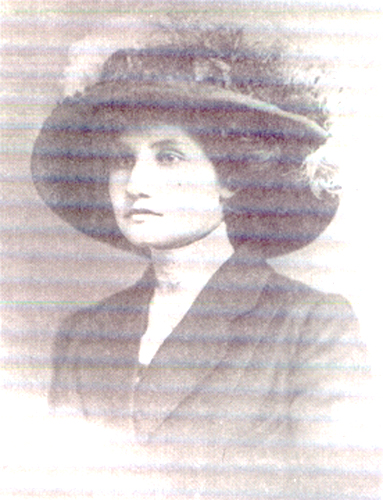 Lottie Deno, who's real name was Carlotta J. Thompkins, was also known at various times as Charlotte Tompkins, and Charlotte Thurmond, was born on April 21, 1844, in Warsaw, Kentucky. She came from a wealthy family. Her father loved to gamble, raised racehorses, and traded in crops grown on the plantation. He took his eldest daughter, Lottie, with him abroad and entertained her at the finest gambling casinos of the world. After he was killed in the Civil War, Lottie's mother and sister were forced to manage the family plantation. To ensure their future security they sent Lottie to Detroit at the age of eighteen to find a husband of the right social standing. She was accompanied by her nanny, a seven-foot-tall black woman named Mary Poindexter. In Detroit Lottie met a jockey, Johnny Golden, who had ridden for her father. Johnny knew Lottie's skill at gambling and invited her to gamble with him. Soon they were doing well, and Johnny enticed her to gamble with him down the Ohio and Mississippi rivers. Lottie's family, who had sponsored her education in Christian schools, was not happy with the news because Johnny was Jewish. Lottie's mother never knew she was with Johnny and thought she had married a wealthy gentlemen. Lottie and Johnny, with Mary as companion, traveled the rivers during the height of the War. Lottie Deno, who's real name was Carlotta J. Thompkins, was also known at various times as Charlotte Tompkins, and Charlotte Thurmond, was born on April 21, 1844, in Warsaw, Kentucky. She came from a wealthy family. Her father loved to gamble, raised racehorses, and traded in crops grown on the plantation. He took his eldest daughter, Lottie, with him abroad and entertained her at the finest gambling casinos of the world. After he was killed in the Civil War, Lottie's mother and sister were forced to manage the family plantation. To ensure their future security they sent Lottie to Detroit at the age of eighteen to find a husband of the right social standing. She was accompanied by her nanny, a seven-foot-tall black woman named Mary Poindexter. In Detroit Lottie met a jockey, Johnny Golden, who had ridden for her father. Johnny knew Lottie's skill at gambling and invited her to gamble with him. Soon they were doing well, and Johnny enticed her to gamble with him down the Ohio and Mississippi rivers. Lottie's family, who had sponsored her education in Christian schools, was not happy with the news because Johnny was Jewish. Lottie's mother never knew she was with Johnny and thought she had married a wealthy gentlemen. Lottie and Johnny, with Mary as companion, traveled the rivers during the height of the War.
  In 1863 the two split and were to meet in San Antonio, Texas. Lottie and Mary traveled to New Orleans and arrived in San Antonio in 1865, but Johnny did not show up for five years. During that time Lottie became a house gambler at the University Club, where she worked for the Thurmond family, from Georgia. She met and fell in love with Frank Thurmond. Lottie was known in San Antonio as the "Angel of San Antonio." Later in 1869 Johnny arrived claiming that Lottie was his wife, but Lottie denied the assertion. Frank went to West Texas after supposedly killing a man in an altercation during a game. Soon Lottie followed to find him, leaving behind Johnny and Mary. She gambled her way around West Texas-Fort Concho, Jacksboro, San Angelo, Denison, and Fort Worth-and eventually moved to Fort Griffin. Johnny Golden killed a man in San Antonio and became an outlaw.
While in Fort Griffin Lottie acquired the moniker, "Queen of the Pasteboards".
 In Fort Concho Lottie had been called Mystic Maud. It was in Fort Griffin that she began to call herself Lottie Deno. The name was supposedly derived from a card game where she was suspected of cheating; one player suggested she should call herself "Lotta Dinero." Johnny Golden followed Lottie to Fort Griffin and was killed there within a day after locating her. Frank Thurmond was there under the alias Mike Fogerty. Lottie's gambling opponents included Doc Holliday and other well-known western figures. She left Griffin in May 1877 to join Frank in Kingston, New Mexico. There she and Frank ran a small gambling room at the rear of the Victorio Hotel. They also set up a saloon in Silver City called the Gem. Later, Lottie owned the Broadway Restaurant in Silver City. On December 2, 1880, in Silver City, New Mexico, Lottie and Frank were married. Carlotta J. Thompkins, the name that appears on the marriage register, is assumed to be her real name. From 1882 until Lottie's death the Thurmonds made their home in Deming, New Mexico, as upstanding and respected citizens. Frank became a miner, then dealt in land sales and eventually became vice president of the Deming National Bank. Lottie, who was always said to be a lady and had always worn the finest clothing and practiced the best manners, gave up gambling and became a founding member of St. Luke's Episcopal Church of Deming. She died on February 9, 1934, and is buried in Deming next to Frank. Frank and Lottie were immortalized as Faro Nell and Cherokee Hall in a series known as the Wolfville books, written by Alfred Henry Lewis. Lottie was also the prototype for Miss Kitty in the television series "Gunsmoke" and for Laura Denbo in Leon Oris's movie Gunfight at the OK Corral (Paramount, 1957).

|